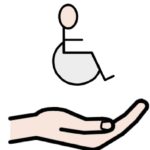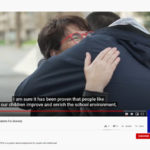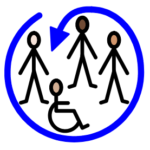Here you will find the recordings and summaries of the training sessions for Inclusion Europe members.
These 1 hour long tutorials focus on various challenges and issues that people with intellectual disabilities and their families encounter.
With our and our members’ expertise, we will provide somehow solutions to these challenges and issues.
Each session opens with a specific case of a piece of work that deals with one of the many aspects of inclusion. It is then followed by a conversation with participants about this piece of work, and about their own experience working on it.
Find out more about the tutorials’ topics, dates, time and registration here.
What works in fundraising for inclusion with Milan Šveřepa — 25 October 2022
Milan Šveřepa is the director of Inclusion Europe.
Milan shared the four important principles you should keep it mind when setting up a fundraising campaign:
- Purpose
- Proposition
- Personality
- Passion
Purpose
Purpose is about answering the questions: Why are we doing what we are doing? What is the problem we are trying to solve? And to answer these questions in a simple way.
Simplicity is key and people must understand what it is all about, what we are actually trying to do, who we are trying to help here. — Milan Šveřepa
Milan explained:
People need to hear stories. People respond to stories. That’s what fundraising needs to be about. Stories about who the organisation is actually helping, how it is solving the problem.
Proposition
Proposition is about meeting the donor halfway. Who are they? What is their goal with the money? Why do they want to donate it to your organisation?
Every person or every organisation is always looking to do good with their money. They decide to do that, and there is a particular angle that is important for them. We must figure out that angle, because that angle needs to match with our purpose. That is when actual donation happens. — Milan Šveřepa
Personality
Personality is about the approach of the organisation. Is fundraising seen as an important part of the organisation as a whole?
Whatever the organisation is doing, should be seen as important as any other part of the organisation’s activities. The entire organisation needs to be committed to the fundraising as it requires certain approaches to doing things that is sometimes not necessarily liked by everyone. For example, it might simplify the work too much. — Milan Šveřepa
Passion
Passion is about reaching out to potential donors in a way that they will respond to. You do not reach that by having a very polished or complicated text, but by sharing stories.
Easy-to-read and understand with Soufiane El Amrani —
8 November 2022
Find the meaning of the words in bold in the dictionary at the end of the document.


Soufiane El Amrani is the
Easy-To-Read expert at Inclusion Europe.
Soufiane presented what Inclusion Europe
is doing on the topic of Easy-To-Read.
At the end, there was a discussion
on new things in Easy-To-Read.

Soufiane explained what Easy-To-Read is.
Easy-To-Read is writing a text in a way that
is simple and easy to understand.
You can find more information
on Easy-To-Read on our website:
https://www.inclusion-europe.eu/easy-to-read/





During the discussion,
many participants shared what
their organisation is doing to
make information more accessible.
Multiple organisations are making
videos in an easy-to-understand way.
This helps people who have difficulty
in reading and understanding to
understand more easily.
It makes a difficult topic
easier to understand.
A short video is more accessible
than a long document.
One participant said that
they want to use avatars
in their videos.
An avatar would make it easier
for people with intellectual disabilities
to recognise themselves and to
understand the information.
Another participant said that she
hopes that easy-to-read will be
used everywhere and not only
for texts for the government.
For example,
Restaurant menus
in easy-to-read.
Or, safety information in case
of a fire in easy-to-read.
One organisation is working
on using computers to
automatically change difficult
texts to easy-to-read.

Soufiane ended his presentation
with a message.
Soufiane said that people with intellectual
disabilities should always be included in
the making of easy-to-read texts.
And, that easy-to-read
information can help everyone.
Legal Action with Helen Portal and Cinzia Agoni from GAMP, Belgium — 15 November 2022
Helen Portal is the policy and advocacy officer at Inclusion Europe. Cinzia Agoni is the spokesperson of GAMP, an NGO that fights against the lack of services and solutions for people with complex needs in Belgium.
Helen gave an overview on how to file a complaint and, Cinzia followed by sharing GAMP’s complaint.
What is a collective complaint?
A collective complaint is based on the European Charter for Social Rights which is followed by the European Committee for Social Rights.
The Committee manages the compliance by two different ways:
- collective complaint
- reports of implementation by state parties
The collective complaint is important for NGOs because it gives them an important role to fight against violations of social rights.
With a collective complaint, countries can be condemned by the European Committee for Social Rights for not implementing the Charter.
The European Charter for Social Rights is complementary to the Convention of Human Rights because NGOs can make a complaint.
Conditions to do a complaint
The complaint has to be made in a country that has accepted and signed the Charter. The Charter is done at the European level via the Council of Europe (47 countries).
The complaint needs to be made by an international NGO (special status).
With the special status of international NGO, the complaint can be made without all the domestic remedies to be exhausted (it is not the last resource to file a complaint) and the international NGO doesn’t need to be the victim of these violations.
This process of filing a legal case to improve Human Rights is called strategic litigation.
There is a big situation of name and shame that is functioning because the more we say that countries have not signed it [ Charter] and there’s no possibility for complaints, the more countries will want to sign it. — Helen Portal, IE
Once the complaint is accepted
The European Committee for Social Rights will judge the merits (content) of the complaint.
It will ask for the state to make a submission and then it will ask the organisation/NGO if they want to reply to the state’s submission.
There can have a hearing but it is rare.
The European Committee for Social Rights will give a decision of whether the state violated or not the charter. If yes, the state can be condemned.
Results
The European Committee for Social Rights can give immediate indications so that the state takes quick measures to end the violations.
The state has to give regular follow ups to the Committee on how they are ending the violations.
There is frustration in a person’s lifetime that it is not easy to see the change. But there is progress. Let’s say optimistic! — Helen Portal, IE
GAMP’s complaint
GAMP sued the Belgium state for violations of the European Charter for Social Rights in 2013.
The complaint was about the lack of solutions and services for people with complexe needs in Belgian regions and communities.
The complaint resulted in the resolution of the European Minister Council and few day cares and residential centres in Brussels and Wallonia were created.
In Flanders, subsidies were given to support services and individual budget were allocated to people with complex needs.
Currently after a few years of progress, the situation is unfortunately stagnating and we have to keep to take up the legal fight. But we can conclude that this kind of action works and puts pressure on political powers. — Cinzia Agoni, GAMP
Family support with “Help the Life” Association, Albania —
22 November 2022
Lediana Xhakollari and Enron Seiti of Help the Life Association Albania joined us for the fourth Tuesday Tutorial at Two to talk about how they support the families of persons with intellectual disabilities.
Why it is important to support families ? (Lediana)
The life of a child with a disability is linked to the life of others in the family and the other way around. Because of this link, if family members are more stressed or sad this will also have a negative effect on the life of a child with a disability. The other way around is true as well if family members are happier this can improve the life of the child.
Families face different challenges including:
- Strong emotions when receiving the diagnosis
- Lack of awareness about the disability
- Stigma
- Lack of personal time
- High stress
- Risk of long-term caregiving stress
Giving adequate support to families can reduce these challenges making families feel less isolated, improving the family’s quality of life and increasing the resilience of the families. It also helps the children to achieve their full potential.
Help the Life Association has two main approaches towards supporting families:
- Parent-professional partnership: creating trust between parents and professionals
- Empowering parents through parent training and coaching: providing parents with the support they need to care for their child.
How Help the Life Association supports families through different types of services depending on the age of the child? (Enron)
During Early Childhood Intervention (0-6 years old):
- Active participation of parents in creating and implementing treatment objectives
- Provide a program for the parents to be implemented at home
- Have regular meetings with the family, including: family therapy, parents group meetings, and trainings.
When the child is between 5 and 21 years old, Help the Life Association offers daily center of services including:
- Sibling self-help groups where siblings can share their experiences and get psychological support among other things
- Parental support with regular meetings with the professional team and family group meetings with other parents.
For people 21 years or older, Help the Life Association has an independent living program which includes:
- Regular meetings with parents to ease the adjustment from living at home to living independently.
- And ‘stay over’ nights where the parents can visit their child and can see for themselves how their child is doing without them.
Promoting active participation with Inclusion Ireland —
6 December 2022
Guillaume Jacquinot and Paul Alford from Inclusion Ireland discussed their work on promoting active participation.
What is Inclusion Ireland?
Paul talked about the history of Inclusion Ireland.
Inclusion Ireland advocates for the rights of people with intellectual disabilities in Ireland.
Our vision: an inclusive Ireland where people with an intellectual disability are supported to live and participate as an equal member within the community. — Paul Alford, II
What is Paul’s role in Inclusion Ireland?
Paul explained his work on making texts from Inclusion Ireland, the government and other organisations in easy-to-read. He he has the final say on them.
He also runs meetings and talks with staff on what support he and others might need.
Inclusion Ireland has a self-advocacy group and it has 4 people with intellectual disabilities on its board.
This way people with intellectual disabilities have a direct say in what Inclusion Ireland works on.
But Paul said:
I think that 4 people is not enough. There should be at least 8 to 10 people on it. It would be a good thing, if everyone followed our steps and have people [with intellectual disabilities] on their board or their committees
The “Respect our Rights” report
Guillaume shared about a report that Inclusion Ireland has written.
‘The respect our rights’ report is about what people with intellectual disabilities think of inclusion in Ireland.
The report is written to give to the United Nations Committee of Rights of People with Disabilities (UN CRPD).
To make the report, Inclusion Ireland created a steering group of 6 people with intellectual disabilities. These 6 people were trained about the UN CRPD and important articles in it.
They chose which articles were important to them and their decisions shaped the report.
For the report, Inclusion Ireland talked with 200 people with intellectual disabilities and 20 family members. They were asked about the topics chosen by the steering group.
They were asked about:
- What are the barriers for people with disabilities in Ireland?
- What should be changed to make things better for people with disabilities?
The report focused on 8 important topics:
- Awareness of disability
- Accessibility
- Inclusive education
- Day services
- Employment and work
- Independent living
- Personal choices and relationships
- Speaking up for yourself
Easy-to-read
Inclusion Ireland now uses easy-to-read texts and videos, to bring people with intellectual disabilities to participate in the research.
EPSA
Soufiane El Amrani is the easy-to-read editor at Inclusion Europe.
He talked about self-advocacy groups.
All people with intellectual disabilities have the right to start their own self-advocacy group or to join an existing self-advocacy group. Self-advocacy groups talk about thing that are important to people with intellectual disabilities — Soufiane El Amrani, IE
Soufiane explained what EPSA is.
The European Platform of Self-Advocates brings people with intellectual disabilities together from all over Europe. EPSA chooses 3 board members of Inclusion Europe.EPSA also gives Inclusion Europe ideas about what work they should do — Soufiane El Amrani, IE
To create inclusive participation, it needs:
- Easy to understand language
- Short sessions
- Breaks
- People with intellectual disabilities
This makes sure everyone can benefit and contribute to the meetings.
Paul ended the presentation with an important message:
Nothing about us without us!
Legal capacity with Som Fundació — 20 December 2022
Josep Tresserras from Som Fundació talked about the legal capacity support system that they have created, called the Som Futur program.
What is Som Futur program?
The Som Futur program is aimed at people with intellectual disabilities and their families who have legally decided that Som Fundació will be the entity that will provide support when the person needs it.
What does the program provide?
The program provides security and confidence for the future. When a support person such as a family member gets ill or passes away, the program can take over the support for the person with intellectual disability and make sure that he/she still gets the support they need.
The Som Futur program gives support for legal capacity in decision-making through “Attention Focused on the Person”-method aimed at strengthening the person’s capacities and self-determination. For this, they have a independent living program and cognitive accessibility program.
What are the two sub-programs?
The independent living program provides the necessary support so that the IDPs we support can live independently and avoid having to do so in an institution. They provide care adapted to the person, help at home and social support.
The cognitive accessibility program aims to improve independent living, increasing the general growth of the person, the ability to control and make personal decisions about how to live and how to carry out the activities of daily life.
The balance sheet
One of the tools Som Fundació developed is the adaptation of the balance sheet, income and expenses in easy-to-read so that the people and their families registered to the program know how much they spend, earn and save.
Personal Assistance with ENABLE Scotland — 10 January 2023
Katie McVay is the Director of Strategy and Development at ENABLE Scotland. She talked about ENABLE’s Personal Assistant model.
What is ENABLE Scotland ?
ENABLE is a group of three charities, ENABLE Scotland, ENABLE Works and ENABLE Cares. They employ 2,500 people and have a turnover of 60 million pounds (68 million euros).
ENABLE Scotland is the core of what ENABLE is today.
It was founded 70 years ago by 5 families who fought for their children with intellectual disabilities to have equal opportunities in care in their local community. Having an equal society is ENABLE’s core value.
ENABLE Works is the employment pillar and ENABLE Cares are the health and social pillars.
What is ENABLE’s PA model ?
It dates back to 2014 when the Self-Directed Support Act was created in Scotland.
ENABLE starting thinking about how to implement the act in the organisation.
ENABLE has 4 components to their PA model: Service Designer, Support Strategies, Bespoke Team of Personal Assistants and Individual Service Fund (ISF).
What are the 4 components of the PA model ?
There is a service designer, meaning that people who need support tells what they want to do with their lives and ENABLE will help them achieve whatever they want to do.
There are support strategies, meaning that ENABLE will come up ways to help people who need support to achieve what they want. It also provides specific ways on how to communicate and act with each person (triggers, anxiety, uncomfortable, etc).
There is an individual service fund, meaning that every people who need support have their own dedicated budget. The budget will help see the expenditures of the services provided and determine the outcomes of what they want to achieve.
There is the bespoke team of personal assistants, meaning that people who need support will be assisted by assistants that they will choose in terms of personalities and interests. The assistants have to pass a recruitment process and are employed to an individual who needs support.
What is the goal of the PA model ?
The goal is for people with intellectual disabilities to have control in their lives in terms of choices, money, independence, work and so on.
It enables families of people with intellectual disabilities to have access to services and support without having to go through the challenges of bureaucracy, finding the right assistant or ending up in an institution.
The PA model is :
- consistent (feasible no matter where you live),
- fair (available no matter the education level and the social capital),
- hight quality (88% mark by the Care Inspectorate compared to a national average of 63%)
- for everyone.
Social media strategy with Josipa Friščić — 17 January 2023
COMING SOON
UN CRPD with Inclusie Nederland — 7 March 2023
This Tuesday Tutorial at Two on March 7 was about how to apply the UN CRPD in practice locally.
Jeroen Veltheer and Alex de Vos from Inclusie Nederland joined us to discuss their work on UN Ambassadors and their ‘Bubbling Inclusion’ project.
The UN Ambassadors project
Inclusie Nederland realised that most of the topics discussed in the UN CRPD are topics that are decided on locally in the Netherlands. Due to this, there is a need of local advocates for the implementation of the UN CRPD.
Inclusie Nederland started the UN Ambassadors. This is a group of advocates that fight for the implementation of the UN CRPD in any way that they can. They chose the name UN Ambassadors as it helps them to be taken seriously.
Most UN Ambassadors are self-advocates, around 95%. Others are family members, policy makers, researchers, or local politicians.
There are more than 500 UN Ambassadors.
The UN Ambassador project helps to build capacity. It is a movement that works from the bottom-up and it turns vulnerability into strength. It also helps increasing the self-esteem of self-advocates.
The UN Ambassadors make a difference by:
- ‘Claiming’ your involvement (obligation article 4-3 of the UNCRPD)
- Not accepting unequal treatment or discrimination
- Advocating for inclusion
- Seeing accessibility from all angles
- Insisting everyone should have control over their own life
The UN Ambassadors help locally by:
- Checking if existing buildings or events are accessible.
- Helping design future buildings or events to be accessible.
- Informing local governments of unequal treatment of people with disabilities and how to improve.
The ‘bubbling inclusion’ project
The UN Ambassadors come together once a month during the ‘bubbling inclusion’. It is based on the Dutch tradition of going for after-work drinks on Friday afternoon. Instead of drinking with your colleagues in a local bar, it is online with the UN Ambassador network.
They use the zoom platform to organise these monthly sessions and each session is build around an important societal theme connected to the UNCRPD.
Every month around 40 advocates join this event.
Back in 2020, the idea first was to get together in person, but the Covid-19 pandemic made this impossible. So instead they organised it online with great success.
The format is:
- Welcome and starting up – 10 min
- Introduction – 5 min
- Guest speaker gives a short presentation on the theme – 30 min
- Discussion in small group (break out rooms) with moderator – 30 min
- Everyone comes back together, moderatos summarise discussions of their small group – 15 min
- Announcements – 15 min
- Bubbling (informal discussion when everyone takes a drink from their own fridge) – until the end
Examples of previous topics:
- Accessible public transportation
- Diversity and intersectionality
- Political active & disability
The online meetings are for many more inclusive as it does not require any travelling. There are also parallel writing interpreters.





